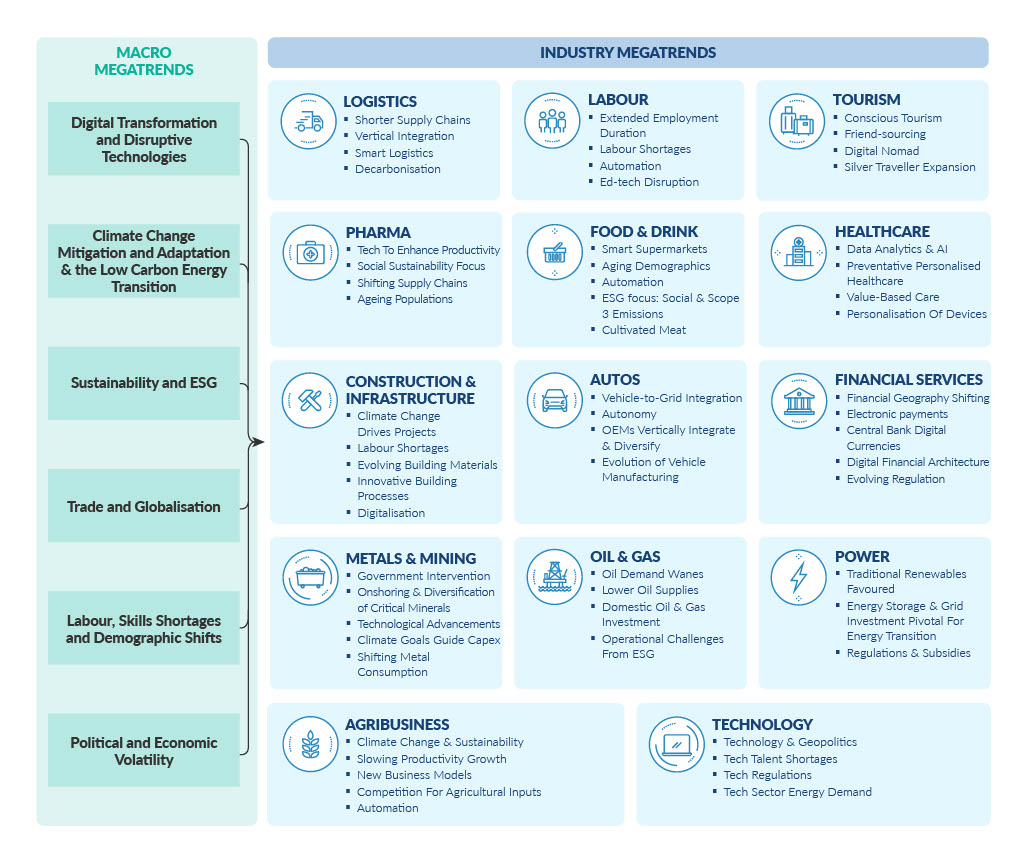Towards 2050: Megatrends in industry, politics and the global economy
The 2023 Megatrends report from BMI provides an outlook for the coming decades, whilst taking into account recent shifts in the global environment. The report highlights six core megatrends that are expected to shape global industries, economies and geopolitics.
- Digital Transformation and Disruptive Technologies: Tech will continue to shape economies and be a force in geopolitics – especially between the US and China. A positive disruptor, advances in technology will drive efficiency gains, productivity growth and new revenue streams in all industries. Connectivity increases the risk of cyberattacks, while disputes over IP could create geopolitical flashpoints.
- Sustainability and ESG (SESG): Environmental factors are driving the greatest industry change, while social and governance considerations are increasingly influencing decisions. Climate change mitigation and adaptation are key focuses of this mega trend.
- Climate Change Mitigation and Adaptation, and the Low Carbon Energy Transition: The transition to a low carbon energy system is a key factor in mitigating climate change and will drive significant industry shifts. High-emitting industries will be most impacted with business models needing to undergo significant shifts over the coming decades. For other industries investments to improve green credentials and reduce emissions such as automation, green energy development and resource efficiency advances will provide opportunities for first movers.
- Labour, Skills Shortages and Demographic Shifts: Global population ageing is leading to labour shortages which will challenge businesses heavily reliant on manual or unskilled labour. It is expected that companies will invest in automation and artificial intelligence over the coming decades to address the labour shortage. Shifting generational priorities and increased social awareness are expected to determine the skill and labour availability across industries, with fewer candidates expected to specialise in tech and oil and gas jobs for example.
- Trade and Globalisation Trends: Permanent shifts in global trade patterns are expected due to pandemic disruption, political tensions and strategic partnerships driven by security concerns. Both companies and governments will respond by increasing resilience of their supply chains. Globalisation will be driven by more strategic trade partnerships driven by political considerations, security and proximity.
- Political and Economic Volatility: Many of these risks are tied to the macro megatrends already highlighted above, with the scale of change expected to create instability as economies and governments deal with an evolving global environment. Global and domestic political risks have the potential to increase over the coming decades as the world order becomes increasingly multipolar. This increases the potential for conflict with emerging markets seeking to increase their power and gain influence. At the same time, rising pressures from urbanisation, demographic shifts and climate adaptation and mitigation will increase the potential for political backlash and domestic political risk.
The table below highlights the key macro and industry megatrends.

Table reproduced with kind permission of BMI
To view the full report, please visit BMI Macroeconomic & Industry Megatrends. Please note that a Fitch Solutions account is necessary to access the report.






